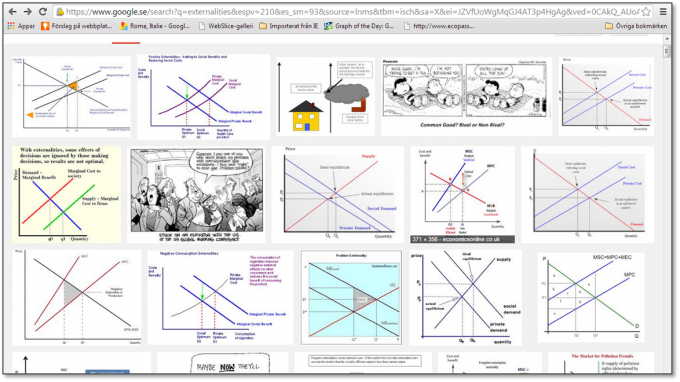
A system with fatigue…?
Having looked at some of the OECD-statistics, trying to understand a little more about current economic development within the OECD-countries – I don’t get it…
When I combine data from Governmental debt, Debt held by citizens and non-citizens, Population and GDP – up until 2007/2008 changes in debt-levels where rather closely related to changes in GDP, but from 2008 the GDP has shown no or very little change (even a decline) while at the same time debt-levels have continued to increase at a high pace…
The same phenomena came up when looking at figures from “Statistics Sweden” – according to their figures, total liabilities in Sweden increased from 429% of GDP in 2007 to 490% in 2012 – while at the same time GDP per capita showed no increase at all.
What are we borrowing for…?
Under normal circumstances lenders and investors always refer to ROI – isn’t that valid anymore, or is it only me not being an economist, interpreting the data in the wrong way…
If we are increasing our debts, but not investing so that the revenue (GDP) increases – how are we then going to pay the increasing interest and payments to the debt… With more loans?
“…an investment operation that pays returns to its investors from their own money or the money paid by subsequent investors, rather than from profit earned by the individual or organization running the operation…”
These are the first sentences from Wikipedia’s description of a fraudulent investment operation – guess which one? (Link to Answer)
Has the loan/debt operation become “perpetual” and self-generating – are we in fact only speculating in current assets, creating higher and higher value without any real “substance” other than the expectation that tomorrow someone will pay more than what I paid today…
Has the Financial system lost “all” contact with reality…?
I sometimes get a daunting sense that the financial system has lost contact with the real world. Maybe it is because of some of the words used, words such as “Intangible assets”, “Goodwill value”, “Derivatives trade” and “Intellectual property”, or maybe the system has become “speed-blind”…
What really worries me is that money “created” on “expectations that eventually might be fulfilled” and values which don’t exist physically so easily can be “transformed” and used to purchase physical assets and resources in the real economy…
I.e. someone can actually sell an expectation of future profit, get instant money for that and then purchase steel or some other real resource with that money…
Can we ever “balance” an economy where so much is based on debt, “expectations” and other “theoretical matters” holding no intrinsic value, with the only real system – Our Planet!
A theoretical idea with no limitations for infinite growth balanced with a finite system – Our Planet?
A dream “come through” or “fall through”…
Let’s play with theories from a Nobel prize winner for a while…
A while back I heard Nobel prize winner Robert Lucas, state in a documentary that economics are unforeseeable, that’s how they work… explaining it like this:
“Nobody is going to pay 1,000,000 for a house this week, if they know it’s going to be worth only 900,000 next week – then they only will pay 900,000 right now…”
Now let’s move this smartness to a similar context.
Through the IPCC report we all know with great certainty that if we burn all the fossil fuels that we know exist, resources that have been already found – we will be “Roasted, toasted, fried and grilled” as the head of the IMF, Ms. Lagarde concluded a while back.
In reality this means that 80% of the “already found and accounted for” fossil fuels have to stay in the ground, otherwise the human society will not survive.
John Fullerton, a former managing director at JP Morgan who now runs the Capital Institute, calculated a while back that at today’s market value, the total amount of known fossil fuels are worth about $27 trillion. Which is to say, when we pay attention to the IPCC and keep 80% of it underground, we will be stranding $20 Trillion in assets.

An amount $4 Trillion larger than the current US National debt.
Have you seen any real decline in prices of fossil fuels or in share prices of Exxon, Shell, Gazprom, bhp Billiton or Koch Industries… “so much for Nobel-Prize winning theories”…
It seems that, in the financial “world”, a hunch that a house might be less worth next week causes immediate action, while clear scientific facts incorporating the risk of our very existance doesn’t
– So what’s your answer to the question; Has the Financial system lost “all” contact with reality?
Externalities
Currently there is a lot of activity with focus on putting an “economic” value on externalities. Does this mean that “matters” that are invaluable such as clean air should be given a financial value based on things like when air pollution impose health costs and clean-up costs on the whole society…
Really! – So money can “replace” clean air, clean potable water, a beautiful scenery or a noise-free landscape – what about an unpolluted (free of excess CO2) Atmosphere – where can I buy that, can I get instant delivery or do I have to wait a thousand years or so…?
Or is it just another “theoretical approach” trying to bring “real intrinsic values” into the “theoretical” financial world…
Our natural resources and ecological assets are for real – financial figures has become “something else” – the transformation needs to ”go the other way” bringing back the finance to real values, not diminishing reality into mere numbers on a balance-sheet…
- “Who is going to estimate the probability that GMO-modified crops will bring havoc to some ecological systems maybe some generation further down the evolution-chain and then set an economic value on that… When we today not even put a strong demand on testing and research before launching it to ‘the market’…”
- “Who is going to estimate the eventual “costs” occurring from adding lead to petrol and paint or from promoting smoking to the public – these should be a lot easier, since they have already happened…”
- “What about developing countries – should the rich privileged few (industrial nations) be able to poison their environment just because ‘we can afford it’…”
- “And what about the elephants – who can put a price on the importance they play in our delicate planetary system – they are protected under law today, but still being killed at a rate of one every fifteen minutes… for the money…”
A Google-search on “Externalities” resulted in this screen…
(Sorry about the poor quality)

Is this the way we want our next generations to remember our “concern” about the Planet…
Something truly amazing reduced to numbers and diagrams …
I do understand the background to why this topic is so “hot” right now, it should of course be costly to interfere with nature and the Planet and the costs should be visible – but come on – if we start to value everything in money-terms, eventually all we’ve got is money… and no planet…
And to be really honest, how likely is it that financial schemes that are much responsible for bringing us into this dilemma are going to take us out of it…using the same “flawed” economic model that brought us here in the first place…
Sometimes when I get really philosophical I can’t help wondering…
“Isn’t it about time to realize that it is not the planetary systems that are wrong – it is the financial system…”
Our planetary systems are of INFINITE VALUE – put that invariable factor into the equation!
… the bottom line is:
